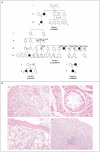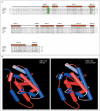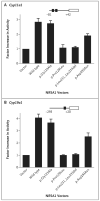Mutations in NR5A1 associated with ovarian insufficiency
- PMID: 19246354
- PMCID: PMC2778147
- DOI: 10.1056/NEJMoa0806228
Mutations in NR5A1 associated with ovarian insufficiency
Abstract
Background: The genetic causes of nonsyndromic ovarian insufficiency are largely unknown. A nuclear receptor, NR5A1 (also called steroidogenic factor 1), is a key transcriptional regulator of genes involved in the hypothalamic-pituitary-steroidogenic axis. Mutation of NR5A1 causes 46,XY disorders of sex development, with or without adrenal failure, but growing experimental evidence from studies in mice suggests a key role for this factor in ovarian development and function as well.
Methods: To test the hypothesis that mutations in NR5A1 cause disorders of ovarian development and function, we sequenced NR5A1 in four families with histories of both 46,XY disorders of sex development and 46,XX primary ovarian insufficiency and in 25 subjects with sporadic ovarian insufficiency. None of the affected subjects had clinical signs of adrenal insufficiency.
Results: Members of each of the four families and 2 of the 25 subjects with isolated ovarian insufficiency carried mutations in the NR5A1 gene. In-frame deletions and frameshift and missense mutations were detected. Functional studies indicated that these mutations substantially impaired NR5A1 transactivational activity. Mutations were associated with a range of ovarian anomalies, including 46,XX gonadal dysgenesis and 46,XX primary ovarian insufficiency. We did not observe these mutations in more than 700 control alleles.
Conclusions: NR5A1 mutations are associated with 46,XX primary ovarian insufficiency and 46,XY disorders of sex development.
2009 Massachusetts Medical Society
Figures




References
-
- Coulam CB, Stringfellow S, Hoefnagel D. Evidence for a genetic factor in the etiology of premature ovarian failure. Fertil Steril. 1983;40:693–5. - PubMed
-
- Laissue P, Vinci G, Veitia RA, et al. Recent advances in the study of genes involved in non-syndromic premature ovarian failure. Mol Cell Endocrinol. 2008;282:101–11. - PubMed
-
- van Kasteren YM, Hundscheid RD, Smits AP, Cremers FP, van Zonneveld P, Braat DD. Familial idiopathic premature ovarian failure: an overrated and underestimated genetic disease? Hum Reprod. 1999;14:2455–9. - PubMed
-
- Luborsky JL, Meyer P, Sowers MF, Gold EB, Santoro N. Premature menopause in a multi-ethnic population study of the menopause transition. Hum Reprod. 2003;18:199–206. - PubMed
Publication types
MeSH terms
Substances
Grants and funding
LinkOut - more resources
Full Text Sources
Other Literature Sources
Medical
Molecular Biology Databases
